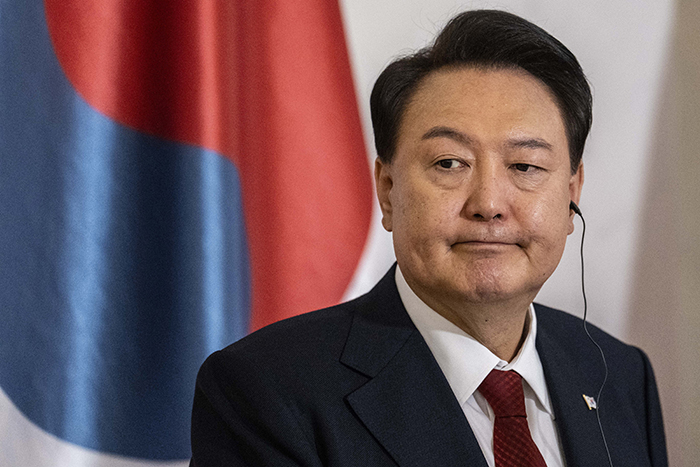Interviews / Asia-Pacific
6 December 2024
Political Crisis in South Korea: Democracy Under Test?

South Korean President Yoon Suk-yeol shocked the nation by declaring martial law during the night of December 3-4, accusing the opposition of being infiltrated by North Korea. This decision, interpreted as a coup d’état, provoked a strong reaction from both institutions and the population of this East Asian country, still marked by dictatorship during the 1970s. The martial law was rejected by parliament, and the soldiers deployed were sent back to their barracks. How can the president’s decision be explained? What might its domestic and international consequences be? What does this episode reveal about the state of democracy in South Korea? Insights from Barthélemy Courmont, research director at IRIS and head of the Asia-Pacific Program.
South Korea was marked on December 3rd by an attempted “coup d’état” by President Yoon Suk-yeol. In what political context did this event occur?
This was not strictly speaking a coup d’état, as Yoon Suk-yeol is the president, elected in 2022 for a five-year term in his country. Among his prerogatives is the possibility to declare martial law, which can be justified, for instance, by a North Korean attack (as the two countries are technically still at war and often face heightened tensions). However, in practice, this decision, which surprised even those within his own camp, resembled a coup d’état, as martial law was, in his view, justified by vague North Korean infiltrations within the opposition ranks, which were directly targeted in his televised speech (at 10:30 p.m. local time, so late in the evening). The South Korean president, elected by a very narrow margin in 2022 and suffering from great unpopularity, particularly related to corruption accusations regarding his wife, has been facing opposition since April, which won the legislative elections by a landslide and now controls the parliament. His power and that of his government are considerably weakened. This “cohabitation” in South Korea has led to difficult negotiations on all proposed bills and decisions. In the current context, deep disagreements surround the budget, and the political climate is tense, with the Democratic Party, which has a parliamentary majority, seeking to block initiatives brought by Yoon. We can also add an international dimension to this domestic political context, with the dramatic rapprochement between Pyongyang and Moscow, which weakens Seoul, and the election of Donald Trump, who might meet with the North Korean leader, as he did three times in 2018-2019. Yoon Suk-yeol has always shown great intransigence towards Pyongyang, supported in this by the Biden administration, which has only 50 days left. Thus, today, Yoon is politically isolated, but also diplomatically isolated, leading the country and making this surprising and dangerous decision.
The reaction from the parliament, which unanimously rejected the declaration of martial law, as well as from the population, which protested in mass, was immediate. What will be the consequences of this failure for the current government?
After Yoon Suk-yeol’s announcement, the army was deployed, particularly around the parliament, and tried to prevent lawmakers from entering to vote on the martial law. In fact, while the president can declare martial law, he must then receive approval from parliament. The lawmakers did not give in and even held the military accountable. At the same time, very large popular rallies took place in the middle of the night, accompanying this democratic outburst and rejection of martial law. It should be understood that in South Korea, this is a highly sensitive issue, as martial law recalls the dark days of dictatorship, up until the 1980s. The lawmakers were eventually able to meet at night and voted unanimously to reject the martial law, delivering a humiliating blow to the president. The next day, the president had to accept the terms, closing a brief and unusual episode in a country whose democratic institutions are globally recognized.
However, it is not over. Opposition parties have initiated an impeachment process against the president, arguing that the martial law was unjustified. It now seems almost certain that this process will succeed, and President Yoon Suk-yeol will not be able to finish his term, which is scheduled to end in 2027. Many South Korean political observers even speak of a political suicide. It is also highly likely that once impeached, he will face legal action in his country for corruption, and possibly also for high treason. Yoon Suk-yeol therefore stands a strong chance of being the fifth democratically elected South Korean president to be sentenced to prison. The question now is whether political parties will agree on an interim government (as was the case at the end of Park Geun-hye’s term in 2017) or if new elections will be held.
Given this situation, what analysis can be made about the state of South Korean democracy? To what extent does this political destabilization weaken the country against its regional rivals, particularly North Korea and China?
The episode of martial law and its subsequent lifting conveys both a very positive and very negative message about the state of South Korean democracy. Very positive, because the South Korean people showed their vigilance and determination to protect their democratic system. At the same time, the army remained calm and did not provoke the crowd. It is also very positive because the political parties immediately took action on this serious issue and demonstrated to the world how well South Korean democracy functions, even when it is under attack from the very person who is supposed to embody it. This sends a strong message to the world: democracies can be strong when they are determined.
But it is also a very negative message, as evidenced by the wide reverberation of this episode globally. South Korean institutions were on the brink of collapse, and in a country where democracy has prevailed for four decades, we witnessed actions more befitting a dictatorship. South Korea is the world’s 10th largest economy, and the consequences of large-scale political destabilization could be severe. Furthermore, in a tense geopolitical context, the fragility of a major democracy should be seen, in South Korea as elsewhere, as a cause for great concern. The geopolitical balance on the Korean Peninsula is extremely fragile, and facing Seoul, Pyongyang has never been in a stronger position since the end of the Cold War, thanks to Moscow’s support. Therefore, South Korea’s domestic political stakes are also a much larger issue, representative of the dangers of our time.

